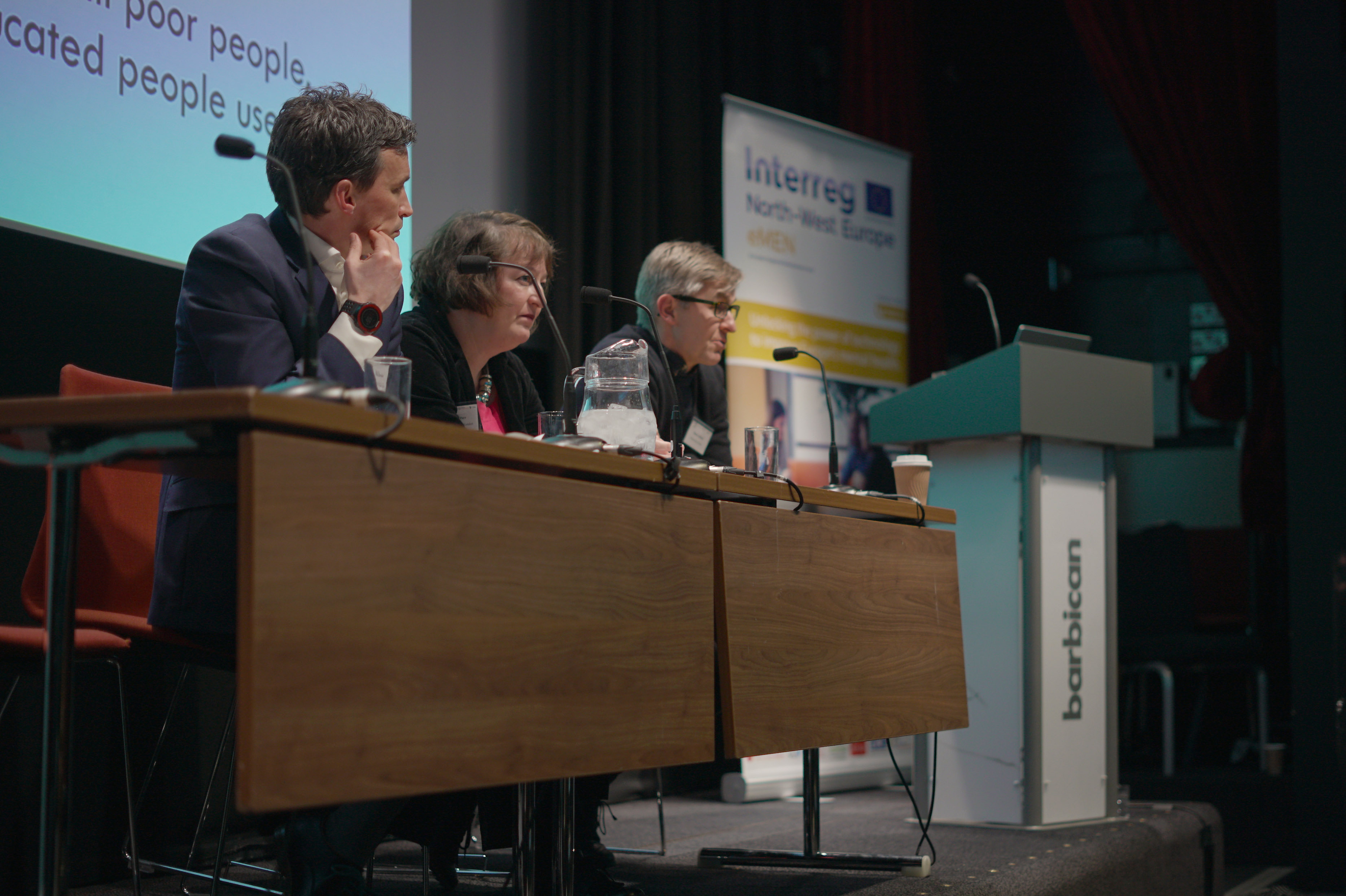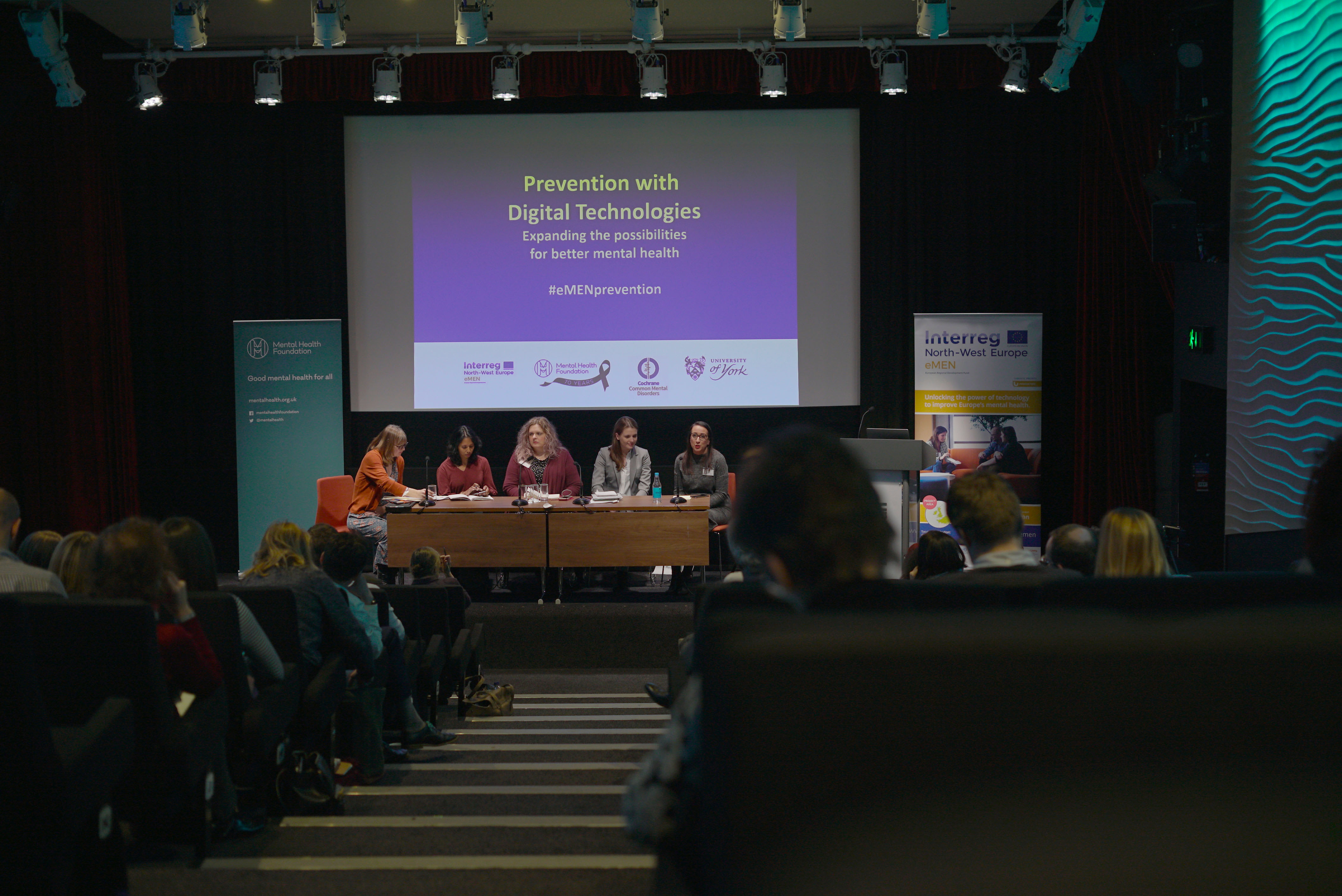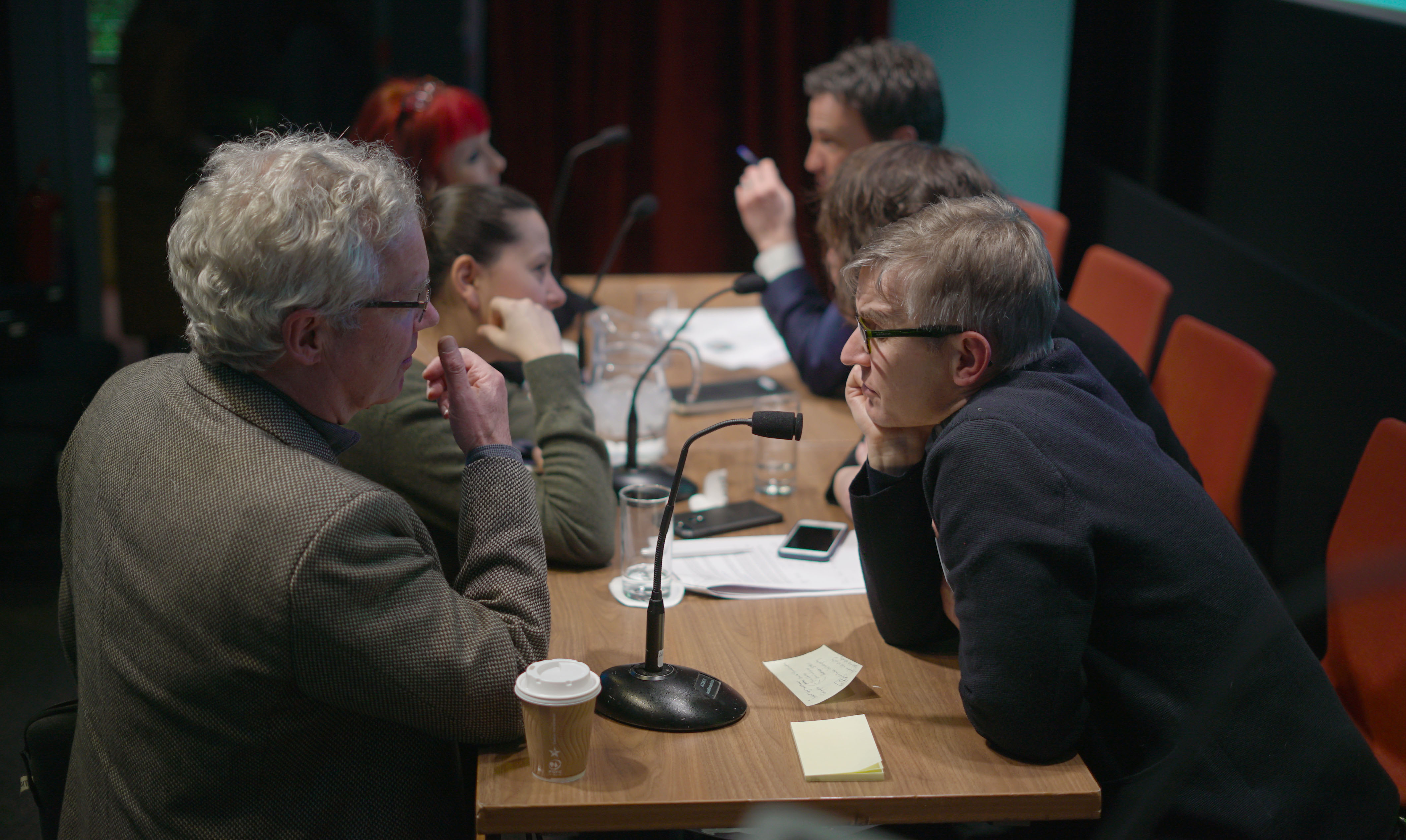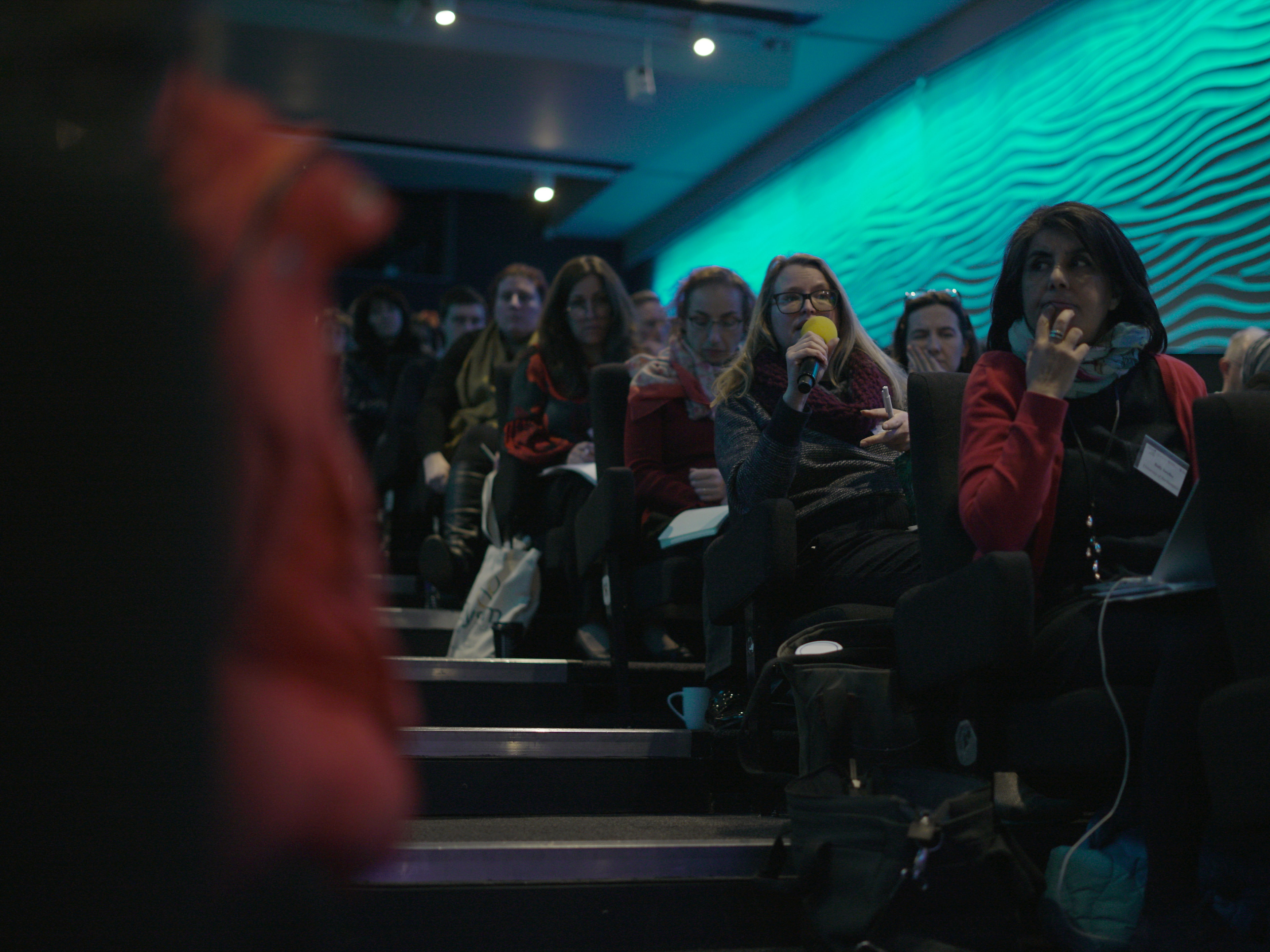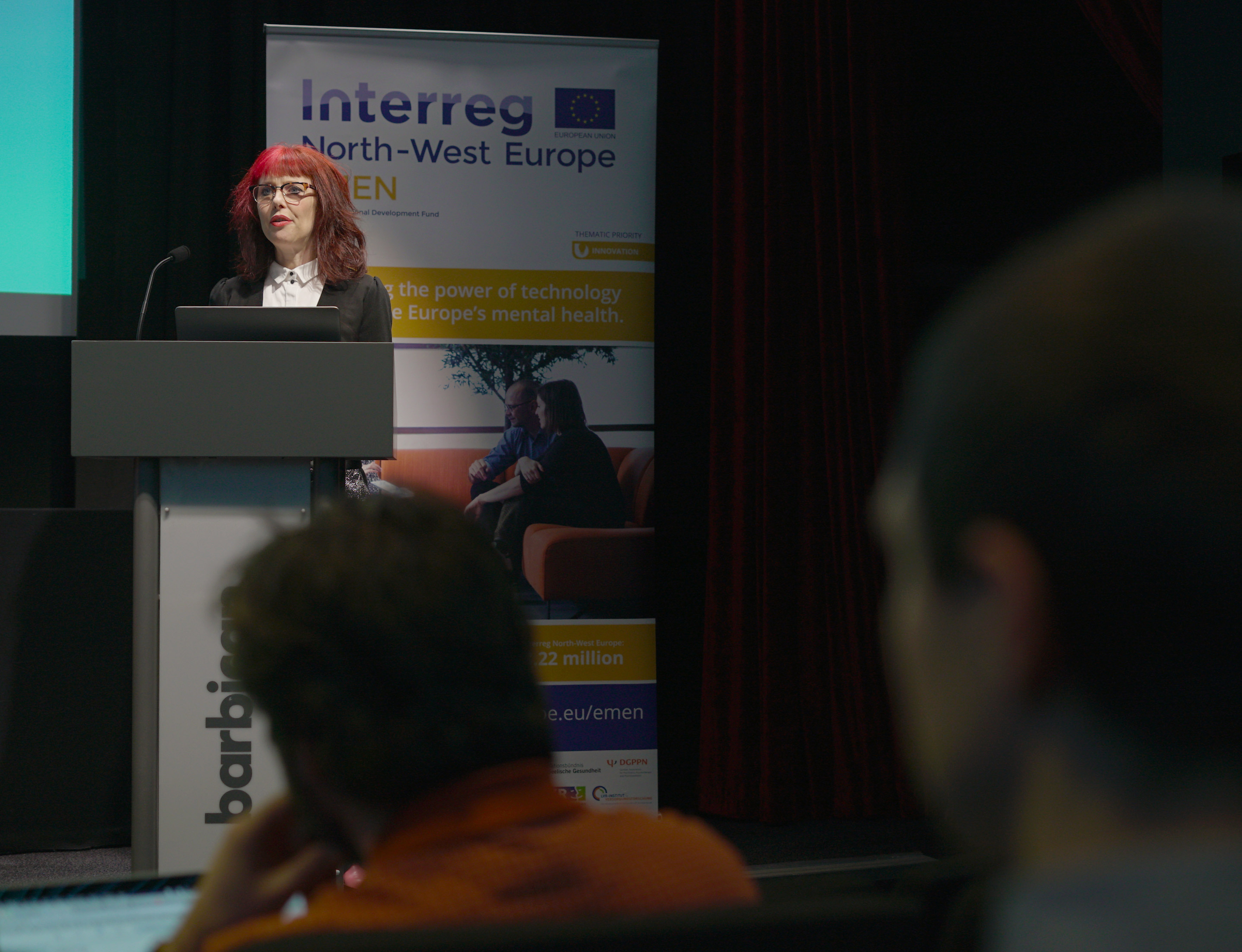On the 24th January 2019, The Mental Health Foundation (UK partner of eMEN) in collaboration with the University of York hosted the conference ‘Prevention with digital technologies: expanding the possibilities for better mental health’ at the Barbican Centre in London. More than 200 delegates came together to learn about and exchange ideas about the evidence behind long-term approaches for a future where digital technologies can help protect against mental health problems and deliver good mental health for all.
The conference opened with the Morning Chair’s Welcome, a stimulating speech by Mark Rowland (CEO, Mental Health Foundation). This set the scene for the day, by delineating the current state of affairs for mental health in the United Kingdom, as well as critical questions around the effectiveness of digital technologies in treatment and prevention solutions. This was followed by an introductory interactive discussion between Mark Brown and André Tomlin (Beyond the Room – see below for more details), Dr Victoria Betton (mHabitat), and the audience, who contributed the questions they wished to address during the day.
The morning speakers at the conference focused on Mental Health Prevention with Digital Technologies, when Dr Lina Gega (University of York) looked at knowledge exchange as the cornerstone of developing ‘fit-for-purpose’ digital mental health interventions for primary, secondary and tertiary prevention. Following Dr Gega’s inspiring talk, Professor Claudi Bockting (University of Amsterdam) focused on embracing the complexity of mental health. She argued that to make mental health interventions effective and sustainable we need to embrace the complexity of mental health and develop and test psychological interventions that target high-risk groups.
The second session of the morning looked at how we can integrate ‘digital’ into practice, beginning with innovative ways of supporting the mental wellbeing of Londoners through digital technology. Tracy Parr (Healthy London Partnership) presented the ‘Good Thinking’ App, which provides practice and early intervention tools to people experiencing insomnia, depression, anxiety and stress. Plans are underway to make this App available to schools, peer to peer networks and London’s top employers and universities in 2019/20.
Professor Simon Gilbody, (University of York) discussed the importance of trials, and in particular the value of those which test interventions that are unsuccessful, and what we can learn from them, such as his trial on computerised CBT (REACT1), which helped to shape REACT2. He demonstrated persuasively, in a lively and entertaining way, that large-scale pragmatic trials that assess digital intervention effectiveness are crucial. The acronym APEASE was put forward as a way to indicate the guiding principles that should be followed before adopting any new technology (A – affordability, P – practicability, E – effectiveness, A – acceptability, S – safety, E – equity).
The afternoon was chaired and introduced by Professor Rachel Churchill of the Cochrane Common Mental Disorders Group (University of York). The first session posed the question How far have we come? How far can we go? Mark Brown (@MarkOneinFour); Dr Victoria Betton (mHabitat); Marcus Gardiner (Softwire and Fellow, Winston Churchill Memorial Trust) and Chris O’Sullivan (Head of Business Development and Engagement, Mental Health Foundation) gave a variety of stimulating and wide-ranging talks on this theme.
Mark Brown, @MarkOneinFour asked how social media can be used more effectively to bring people with mental health problems together and help them connect, how co-production can be achieved, and whether digital health interventions increase the reach and access to groups less well served by mental health services. Prevention in digital tech needs to put the user at the centre and ensure that the marketing of the product does not contradict its mental health aims.
Dr Victoria Betton (Director, mHabitat) discussed Teen Mental Health in an Online World, starting with the question: What if we approached the internet as a resource to be deployed rather than a problem to be solved? Adult views of young people’s online behaviours are typically characterised by concerns about risk – but we have to get the balance right. Professionals are themselves at risk of being out of touch with their patients by choosing not to engage with social media and to learn about how it affects mental health.
Marcus Gardiner (Softwire and Fellow, Winston Churchill Memorial Trust) looked at digital mental health in the workplace and discussed the Softwire app that has been created for mental ill health in the workplace. He noted the pervasive culture of silence about mental health at work, and the need for better means to detect it. Chris O’Sullivan (Mental Health Foundation) then spoke about the importance of online peer support, arguing that young people’s mental health should be made a priority and that we need to bring sectors together to engage with the evidence around digital solutions.
Finally, there was a livestreamed panel discussion on the Benefits and Challenges of Digital Technologies for Mental Health, looking at how we can ensure effective co-production, access and equity in the development and use of cost effective digital mental health technologies in the fast-moving field of varied technologies and approaches. The panellists were: Dr Diane Pennington (University of Strathclyde), Dr Divya Srivastava (Programme Lead of Infrastructure for the Mental Health Policy Team at NHS England), Josefien Breedvelt (Research Lead, Mental Health Foundation) and Nicola Tiffany (Director HMA, Tech partner Calm Harm and Clear Fear apps).
During the day, the Janice Sinson award was presented by Dr Antonis Kousoulis of the Mental Health Foundation to early-career researcher Emily Eisner (PhD Researcher, University of Manchester), who presented a poster of her research project Development and long-term acceptability of ExPRESS, a smartphone app to monitor basic symptoms and early signs of psychosis relapse. Kieran Woodward and Mariana Pinto da Costa were commended for their research projects, on which they also presented posters during the morning and lunchtime breaks.
The conference was livestreamed via #BeyondTheRoom, a collaboration involving Mark Brown (@MarkOneInFour), Vanessa Garrity (@VanessaLGarrity) and André Tomlin (@Mental_Elf), who increase the reach and impact of mental health conferences and events by live blogging, tweeting, podcasting and streaming what happens in the room to their social media audience of over 100,000 followers #BeyondTheRoom. Their involvement, using the hashtag #eMENprevention, resulted in: 372 people tweeting on the day; 1,300 tweets; 23.3 million Twitter impressions; 48 views the live-streamed panel discussion, and 44-79 listeners to four podcasts. If you missed the conference, you might find it interesting to look at the discussion and material shared on Twitter throughout the day.
During this conference, a marketplace was set up in the breakout area for SMEs to present their product. These included: Shift, BfB Labs (Gaming to help tackle anxiety in children: bfb-labs.com/anxietygaming and Gaming for better emotional regulation: bfb-labs.com/cots); MyMood, an Android mood tracker developed by researchers at University College London and The Alan Turing Institute; Calm Harm (Dr Nihara Krause), a free app that helps children and young people (CYP) resist or manage the urge to self-harm, for teenage mental health charity stem4: www.calmharm.co.uk; Clear Fear (Dr Nihara Krause), a free app providing CYP with a range of ways to manage anxiety: www.clearfear.co.uk; and Be Mindful, a fully online Mindfulness-Based Cognitive Therapy (MBCT) course used by over 20,000 people, provided to individuals in healthcare and workplace settings and direct via www.bemindfulonline.com.
Overall, the conference attracted international participants as well as a wide range of UK health and social care professionals, service providers, experts by experience, people with caring responsibilities, SME developers and academics.

